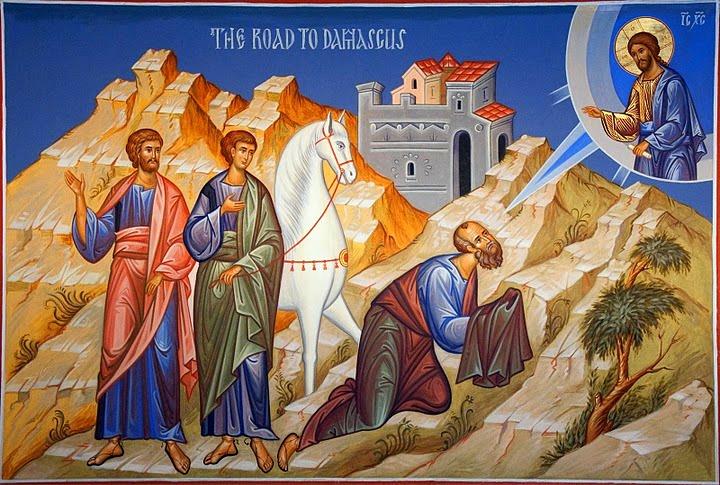 |
| The Conversion of Paul |
Premillennialists hold that these verses refer to a resurrection of the righteous at the beginning of a future millennial reign of Christ. There are a number of problems with that interpretation.
Notice first of all what is resurrected: not the bodies of the righteous, but rather their souls. In other words, John is using "resurrection" in a metaphorical, not a literal, sense. He has used this metaphor before. Our author uses "resurrection" in the spiritual sense in his Gospel. In chapter 5, verses 24-25, he quotes the Lord Himself, "Truly, truly, I say to you, whoever hears My word and believes Him who sent Me has eternal life. He does not come into judgment, but has passed from death to life. Truly, truly, I say to you, and hour is coming, and is now here, when the dead will hear the voice of the Son of God, and those who hear will live." Then, as in the Apocalypse, Jesus proceeds from this spiritual resurrection to the physical.
In the Old Testament, the Prophet Ezekiel uses the metaphor of resurrection to describe God's regeneration of His elect. Chapter 37:11-14 tell us, "Then He said to me, 'Son of man, these bones are the whole house of Israel. Behold, they say, "Our bones are dried up, and our hope is lost; we are clean cut off." Therefore prophesy, and say to them, Thus says the Lord God: "Behold, I will open your graves and raise you from your graves, O My people. And I will bring you into the land of Israel. And you shall know that I am the Lord, when I open your graves, and raise you from your graves, O My people. And I will put My Spirit within you, and you shall live, and I will place you in your own land. Then you shall know that I am the Lord; I have spoken, and I will do it, declares the Lord."'"
And elsewhere in the New Testament, Paul uses the resurrection metaphor in the epistles to both the Ephesians and the Colossians. In Eph. 2:5-6, Paul says, "when we were dead in our trespasses, [God] made us alive together with Christ - by grace you have been saved- and raised us up with Him and seated us with Him in the heavenly places in Christ Jesus." And Col. 3:1, "If then you have been raised with Christ, seek the things that are above, where Christ is, seated at the right hand of God."
Thus, logically, to interpret the first resurrection as a literal, physical resurrection is forbidden by the text itself, and instead requires a spiritual interpretation, consistent with its use elsewhere in both testaments, especially in the writing of our present author.
What interpretation then presents itself? That the first resurrection is the spiritual passing from death to life by the regeneration of the Holy Spirit, the only way that sinful men become "blessed and holy" (Revelation 20:6). The second resurrection is then the literal physical rising usually connected with the term. Thus the millennium is the period in between, when Christ in His Gospel, through the Holy Spirit, is converting His elect, and ruling in and through them. Thus, this passage forbids the premillennial interpretation usually forced upon it, and logically directs the reader to either the amillennial or postmillennial positions (the difference between these two isn't answered by this text). The first death would then be the physical, while the second death would be the condemnation of the reprobate. That is why the one who has been converted, i.e., been through the first resurrection, is not subject to the second death. As Jesus says in the text from John (5:24), "He does not come into judgment, but has passed from death to life."




No comments:
Post a Comment